Watch These 9 Documentaries to Increase Media Literacy
With the vast amount of media we consume on a daily basis—11 hours for the average American—we all need more media literacy.
In my other post on how to improve media literacy, I shared tips and resources on how to be critical thinkers while engaging with media and advertising, as well as how to spot fake news.
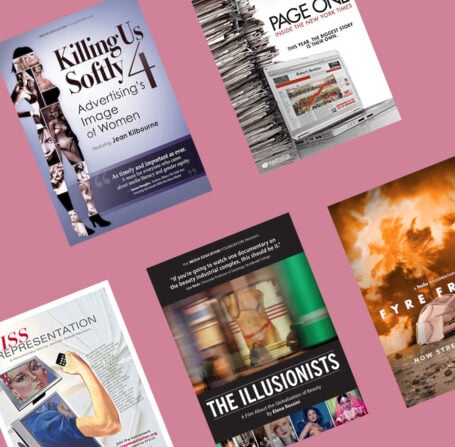
When you purchase through links on this site we may earn a commission at no extra cost to you. This helps us provide free content for you to enjoy.
In this post, I'm recommending 9 of the most relevant documentaries I could find on improving media literacy. Many of them you can watch on Kanopy, a free streaming service that only requires your library card.
1. Killing Us Softly 4: Advertising's Image of Women
Year: 2010 | Running time: 46 mins
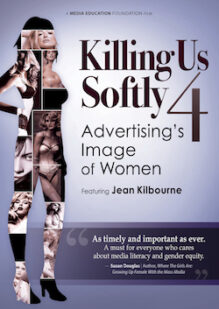
Jean Kilbourne takes a fresh look at how advertising traffics in distorted and destructive ideals of femininity. The film marshals a range of new print and television advertisements to lay bare a stunning pattern of damaging gender stereotypes—images and messages that too often reinforce unrealistic, and unhealthy, perceptions of beauty, perfection, and sexuality. By bringing Kilbourne's groundbreaking analysis up to date, Killing Us Softly 4 stands to challenge a new generation of students to take advertising seriously, and to think critically about popular culture and its relationship to sexism, eating disorders, and gender violence.
Why watch: The ridiculousness of the ads paired with Kilbourne's sensible commentary provides a riveting viewing, even though this documentary is basically a filmed slideshow presentation.
Where to watch it: Kanopy, their website.
2. The Illusionists: The Globalization of Beauty
Year: 2015 | Running time: 55 mins
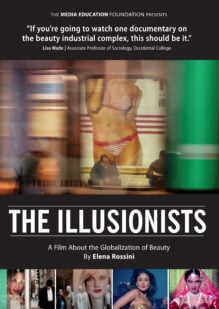
The Illusionists examines how global advertising firms, mass media conglomerates, and the beauty, fashion, and cosmetic surgery industries are changing the way people around the world define beauty and see themselves. Taking us from Harvard to the halls of the Louvre Museum, from a cosmetic surgeon's office in Beirut to the heart of Tokyo's Electric Town, the film explores how these industries saturate our lives with narrow, Westernized, consumer-driven images of beauty that show little to no respect for biological realities or cultural differences. Features prominent sociologists, politicians, magazine editors, scientists, artists, and activists in North America, Europe, the Middle East, and Asia.
Why watch: We all know advertising works by exploiting and amplifying our insecurities, but what I found most interesting from this documentary is the glimpse into advertising's future. Since the formula used to beat out self-esteem in women has saturated the market, they're now extending this to men. In India, for example, men are being sold on the idea of using skin lightening creams so they can achieve status and attract women. In Japan, digitally-created idols exist alongside their human counterparts.
Where to watch it: Kanopy, their website.
3. Page One: Inside the New York Times
Year: 2011 | Running time: 91 mins
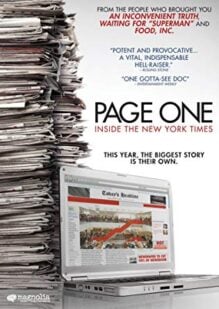
With the Internet surpassing print as the main news source and newspapers all over the country going bankrupt, PAGE ONE chronicles the transformation of the media industry at its time of greatest turmoil. It gives us an up-close look at the vibrant cross-cubicle debates and collaborations, tenacious jockeying for on-the-record quotes, and skillful page-one pitching that produce the “daily miracle” of a great news organization. What emerges is a nuanced portrait of journalists continuing to produce extraordinary work under increasingly difficult circumstances.
At the heart of the film is the burning question on the minds of everyone who cares about a rigorous American press, Times lover or not: what will happen if the fast-moving future of media leaves behind the fact-based, original reporting that helps to define our society?
Why watch: A fascinating look at the inner workings of The New York Times, this is the real-life equivalent of Spotlight. Viewers gain more insight on what is real journalism versus yellow journalism—clickbait news have gotten even worse since 2011 when this came out—and the doc also reveals how unethical journalists can cause havoc when they're backed by the reputation of a legacy newspaper. The film could have spent more time on the latter, but it makes up for it with scenes featuring Times journalist David Carr, especially the one when he tells off those Vice guys during an interview.
Where to watch it: Amazon
4. Miss Representation
Year: 2011 | Running Time: 90 mins
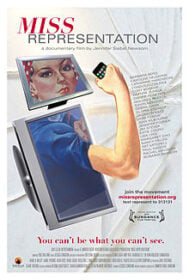
Written and directed by Jennifer Siebel Newsom, the film exposes how mainstream media contribute to the under-representation of women in positions of power and influence in America. The film challenges the media's limited and often disparaging portrayals of women and girls, which make it difficult for women to achieve leadership positions and for the average woman to feel powerful herself.
Why watch: It's only clear how much bullshit girls and women have to put up when this documentary hits us with it all at once.
Where to watch it: Kanopy, Netflix, Amazon, their website
5. Channels of War - The Media is the Military
Year: 2005 | Running Time: 28 mins
The mainstream television networks have fanned the flames of war, and have profited from doing so. This program looks at how the U.S. corporate media has sanitized our field of vision. Part ten of a twelve part series from Deep Dish TV on the war in Iraq.
Why watch: Learn how even the most well-meaning journalists can unintentionally side with soldiers from their own country due to limited access on the frontlines. This short program also shows how major news outlets can affect the public's perception of war with biased coverage.
Where to watch it: Kanopy
6. Fyre Fraud
Year 2019 | Running Time: 1h 36m
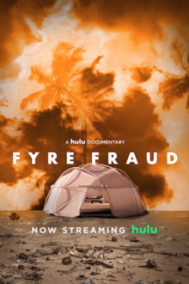
FYRE FRAUD is a true-crime comedy exploring a failed music festival turned internet meme at the nexus of social media influence, late-stage capitalism, and morality in the post-truth era.
Why watch: While I recommend watching both documentaries on the Fyre Festival—and I would argue the Netflix one is better produced and more intriguing—I'm recommending the Hulu doc because it spends more time analyzing and critiquing the marketing hype and power of the influencers that built the festival. A fascinating look at a conman exploiting millennials' desires to be seen and liked on Instagram. I'm betting Martin Scorcese will make a film about Billy McFarland in a few years' time.
Where to watch it: Hulu
7. The Great Hack
Year 2019 | Running Time: 2h 19m
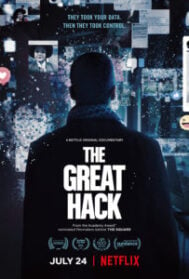
Exploring how a data company named Cambridge Analytica came to symbolise the dark side of social media in the wake of the 2016 U.S. presidential election, as uncovered by journalist Carole Cadwalladr.
Why watch: I'm always surprised when people tell me they've accepted the fact media companies and governments have access to their personal data. Are you kidding me? This documentary shows all the reasons why this is dangerous. It is terrifying.
Where to watch it: Netflix
9. The Social Dilemma
Year 2020 | Running Time: 1h 34m
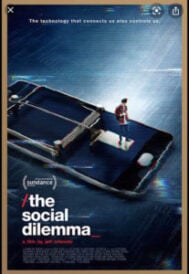
This documentary-drama hybrid explores the dangerous human impact of social networking, with tech experts sounding the alarm on their own creations.
Why watch: While many of what this doc unveiled doesn't surprise me after watching other docs such as The Great Hack, it is interesting to see the inventors of many the social media functions, such as the Like button and endless scrolling, talk about its dangers. Hypocritical, yes, but if these people are not letting their children use social media, why are we?
Where to watch: Netflix
Learn how to improve your media literacy with these simple tools and resources.